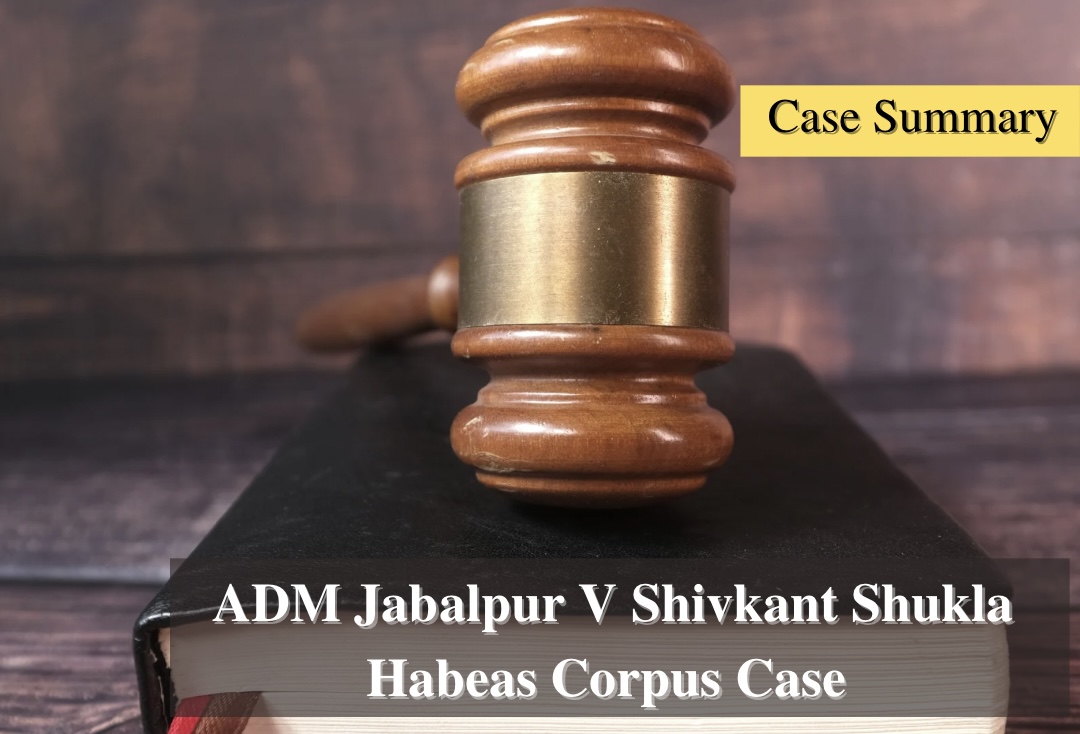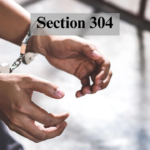
Quick Easy Summary of ADM Jabalpur V Shivakant Shukla – Habeas Corpus Case
ADM Jabalpur V Shivakant Shukla
(1976) Supp SCR 172 : AIR 1976 SC 1207 : 1976 Cr LJ 945 : (1976) 2 SCC 521
Brief
Citation : (1976) Supp SCR 172 : AIR 1976 SC 1207 : 1976 Cr LJ 945 : (1976) 2 SCC 521
Court : The Supreme Court Of India
Date of Decision : 28 April 1976
Judges : CJ A.N Ray, M.H Beg, Hans Raj Khanna, P.N Bhagwati and Y.V Chandrachud, JJ
Facts
The Facts of this Landmark Judgement are as follows. On 25th June 1975 the President in exercise of powers conferred by Article 352 Clause (1) of the Constitution declared that a grave emergency exists because of which the security of India is threatened by internal disturbances. On 27th June 1975 in exercise of powers conferred by Article 359 Clause (1) the President declared that the right of any person including a foreigner to move to any court for the enforcement of the rights conferred by Article 14, Article 21 and Article 22 of the Constitution of India and all proceedings pending in any court for the enforcement of the above mentioned rights shall remain suspended for the period during which the proclamations of emergency made under Article 352 Clause (1) of the Constitution on 3rd December 1971 and 25th June 1975 are in force.
The Presidential Order of 27th June 1975 further stated that the same shall be in addition to and not in derogation of any order made before the date of the aforesaid order under Article 359 Clause (1 ) of the Constitution. The respondents who were detained under the Maintenance of Internal Security Act (MISA), 1971 petitioned in different High Courts for the Writ of Habeas Corpus. The case originated with many preventive detentions made in the country before 26th June 1975 “before the proclamation of emergency”. The Hon’ble High Court did not examine the validity of the proclamation or its continuation, as a consequence the case came before the Hon’ble Supreme Court of India by way of appeals against the order of the High Court.
Issues
The issues which were raised were as following:
– Whether a writ petition under Article 226 before a High Court is maintainable to enforce the right to personal liberty during an emergency declared under Article 352 Clause (1) of the Constitution of India ?
– If such a petition is maintainable then what is the scope of judicial scrutiny in view of Presidential Order ?
Judgement
When it comes to the enforcement of the right of personal liberty guaranteed by Article 21 is suspended by a Presidential Order, the detinue cannot circumvent the Presidential Order and challenge the legality of his detention by falling back on the right of personal liberty based on the principle of the Rule of Law.
If the right to enforce personal freedom through a writ of Habeas Corpus is suspended under Article 359 during a proclamation of emergency under Article 352 of the Constitution of India. it cannot be said that the enforcement can be restored by resorting to any other purpose. That other purpose could not embrace defeating the effect of suspension of the enforcement of a constitutional guarantee.
Consequently, a writ of Habeas Corpus or any power of a High Court under Article 226 could not come to the aid of a detinue when the right to enforce a claim to personal freedom, sought to be protected by the Constitution is suspended. Article 359 Clause (1) makes no distinction between the threat to security of India by war or external aggression on one hand and threat to the security of India by internal disturbance on the other.
Powers of President under Article 352 Clause (1) and Article 359 Clause (1) of our Constitution are immune from challenge in courts even when the emergency is over. The remedies to which the detinue is entitled while detained under the Presidential Order of 27th June 1975 and 8th January 1976 is a suit for false imprisonment which is one of the categories of Law of Torts.
Section 16 of the Maintenance of Internal Security Act, 1971 leaves open a remedy by way of suit for damages for wrongful imprisonment. The Presidential Order would have no operation where a detinue is relying upon a provision of law to enforce a legal right conferred on him and is not complaining of absence of legal authority in the matter of deprivation of his personal liberty.
Section 16A(9) of the Maintenance of Internal Security Act (MISA), 1971 is not unconstitutional on the ground that it constitutes an encroachment on the writ justification of the High Court under Article 226. Section 16A(9) of MISA enacts a genuine rule of evidence and it does not detract from or affect the jurisdiction of the High Court under Article 226 of the Constitution of India. Hence, cannot be successfully assailed as invalid. Furthermore Section 18 of MISA does not suffer from the vice of excessive delegation and is a valid piece of the legislation.
Part III of the Constitution of India confers Fundamental Rights in a positive and on the other hand in a negative language. Limits of judicial review have to be coextensive and commensurate with the right of an aggrieved person to complain of the invasion of his rights and the theory of Basic Structure of the Constitution cannot be used to build into the Constitution an imaginary part which may be in conflict with the constitutional provisions provided.
Held
In Light of the Presidential Order dated 27th June 1975, no person has any “Locus Standi” to move any writ petition under Article 226 before the High Court for the writ of “Habeas Corpus” or any other writ or order or direction to challenge the legality of an order of detention on the ground that the order is not under or in compliance with the Act or was illegal or was vitiated by “Malafide” factual or legal or is based on extraneous considerations. Therefore, Section 16A(9) 0f the Maintenance of Internal Security Act (MISA) was Constitutionally valid.
Read more







